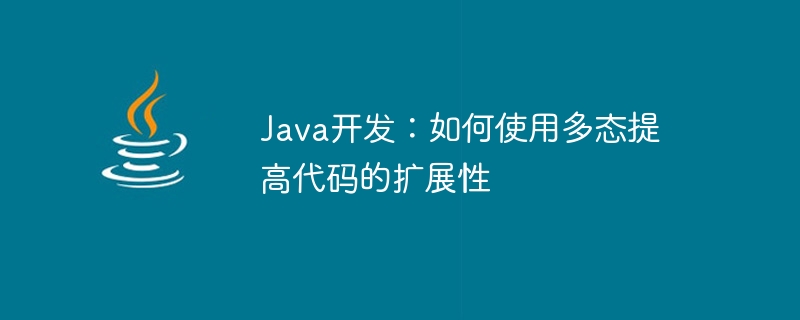Home >Java >javaTutorial >Java development: How to use polymorphism to improve code scalability
Java development: How to use polymorphism to improve code scalability
- 王林Original
- 2023-09-21 09:24:331280browse

Java development: How to use polymorphism to improve code scalability
Abstract: In Java development, polymorphism is an important feature. By using polymorphism , we can improve the scalability and maintainability of the code. This article introduces the concept of polymorphism and uses specific code examples to illustrate how to use polymorphism to improve code structure.
Text:
Polymorphism is an important concept in object-oriented programming. It allows us to use a parent class reference variable to reference objects of different subclasses, thereby dynamically selecting them at runtime. Call the subclass method. By using polymorphism, we can make our code more flexible, extensible, and maintainable. Below we use a specific example to illustrate how to use polymorphism to improve code scalability.
Suppose we are developing a simple graphics drawing program with two graphics: rectangle and circle. We need to write a method to draw different types of graphics and want to be able to easily add more types of graphics.
First, we create an abstract class Shape as the parent class of all graphics, which contains an abstract method draw():
abstract class Shape {
abstract void draw();
}Then we create two subclasses: Rectangle and Circle.
class Rectangle extends Shape {
void draw() {
System.out.println("绘制矩形");
}
}
class Circle extends Shape {
void draw() {
System.out.println("绘制圆形");
}
}Next, use polymorphism in our drawing method to improve the scalability of the code.
public class DrawingProgram {
void drawShape(Shape shape) {
shape.draw();
}
public static void main(String args[]) {
DrawingProgram program = new DrawingProgram();
// 绘制矩形
Shape rectangle = new Rectangle();
program.drawShape(rectangle);
// 绘制圆形
Shape circle = new Circle();
program.drawShape(circle);
}
}In the above code, we created two subclass objects, namely rectangle and circle, through the parent class Shape, and called the drawShape method to draw the corresponding graphics.
Now suppose we need to add a new shape type, such as a triangle. We only need to create a new subclass Triangle and inherit from Shape, implement the draw method, and then call the drawShape method in the main function.
class Triangle extends Shape {
void draw() {
System.out.println("绘制三角形");
}
}
public class DrawingProgram {
// ...
public static void main(String args[]) {
// ...
// 绘制三角形
Shape triangle = new Triangle();
program.drawShape(triangle);
}
}By using polymorphism and abstract classes, we do not need to modify the original code, and can easily add new graphics types without affecting existing functions.
Summary:
By using polymorphism, we can separate the specific type of an object from how it is used, thus providing better code scalability and maintainability. When writing code, we should try to use abstract classes or interfaces as variable types instead of concrete classes, which can make the code more flexible and scalable. Through the sample code, this article hopes that readers can have a clearer understanding of the concept and use of polymorphism, and be able to flexibly use polymorphism in actual development to improve the scalability of the code.
The above is the detailed content of Java development: How to use polymorphism to improve code scalability. For more information, please follow other related articles on the PHP Chinese website!

